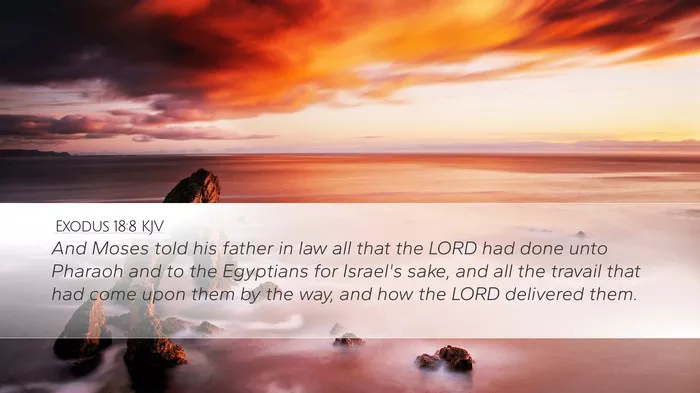Read the Daily Bible Verse – Exodus 18:8 To Strengthen Your Spiritual Journey.
Exodus 18:8 is a profound verse in the Bible that carries significant theological, historical, and practical applications for believers. This article explores the meaning and relevance of this scripture through its context, interpretation, comparison with other biblical texts, and modern-day application.
The Context on Exodus 18:8 KJV
Exodus 18:8 (KJV) states:”And Moses told his father-in-law all that the Lord had done unto Pharaoh and to the Egyptians for Israel’s sake, and all the travail that had come upon them by the way, and how the Lord delivered them.”
This verse is part of a larger narrative in Exodus 18, which recounts the visit of Jethro, Moses’ father-in-law, to the Israelite camp. Jethro, a Midianite priest, heard of God‘s mighty deeds in delivering Israel from Egyptian bondage. Upon meeting Moses, Jethro was told in detail about the miracles, struggles, and divine deliverance experienced by the Israelites.
The chapter begins with Jethro bringing Moses’ wife, Zipporah, and their sons to him in the wilderness, where they were encamped at Mount Sinai. The reunion sets the stage for Moses to share God’s faithfulness. This conversation highlights the power of testimony in declaring God’s work and strengthening the faith of others.
The Exodus 18:8 Meaning
Exodus 18:8 serves several important purposes in the biblical narrative:
A Testimony of Deliverance:
Moses recounts God’s intervention in freeing the Israelites from slavery. The emphasis on what “the Lord had done” underscores that their deliverance was not by human strength but by divine power.
Acknowledgment of Suffering:
The verse does not shy away from mentioning “all the travail” faced by the Israelites. This inclusion reflects the reality of challenges in the journey of faith. It reminds readers that suffering is often part of God’s redemptive process.
God’s Faithfulness:
Despite the trials, Moses highlights how “the Lord delivered them.” This statement confirms God’s unwavering commitment to His promises and His people.
Witnessing to Others:
By sharing these events with Jethro, a non-Israelite, Moses demonstrates the importance of proclaiming God’s works to all nations, foreshadowing the universal scope of God’s redemptive plan.
Exodus 18:8 Application in Life
The principles in Exodus 18:8 can be applied to our lives in several ways:
Sharing Testimonies:
Believers are encouraged to share their personal experiences of God’s faithfulness, just as Moses did. This act strengthens the faith of others and glorifies God.
Acknowledging Challenges:
Life often involves struggles, but acknowledging them alongside God’s deliverance can provide a more complete picture of His work.
Encouraging Gratitude:
Reflecting on past deliverances fosters a heart of gratitude and trust in God’s future provision.
Engaging with Others:
Sharing the works of God with those outside the faith, as Moses did with Jethro, opens doors for evangelism and discipleship.
Comparison with Other Biblical Texts
Exodus 18:8 can be compared with other passages in the Bible that emphasize testimony and divine deliverance:
Psalm 66:16:
“Come and hear, all ye that fear God, and I will declare what he hath done for my soul.” This verse resonates with the spirit of Exodus 18:8, encouraging believers to share what God has done.
Revelation 12:11:
“And they overcame him by the blood of the Lamb, and by the word of their testimony.” This passage underscores the power of testimony in overcoming spiritual challenges.
Deuteronomy 6:20-25:
Here, Moses instructs Israel to tell future generations about God’s deliverance. This parallels Exodus 18:8 in its focus on recounting God’s mighty acts.
Modern-Day Relevance
Exodus 18:8 remains highly relevant today:
Community Building:
Just as Moses shared his testimony with Jethro, believers can use their stories to strengthen community bonds and inspire others.
Faith Amid Trials:
The acknowledgment of travail reminds modern readers that challenges are part of the faith journey but are accompanied by divine deliverance.
Global Evangelism:
Moses’ act of sharing God’s works with a non-Israelite reflects the call to evangelize and proclaim God’s deeds to all people.
Strength in Gratitude:
Reflecting on past deliverances builds resilience and trust in God for future challenges.
Conclusion
Exodus 18:8 encapsulates the power of testimony, the reality of trials, and the faithfulness of God. It calls believers to share their experiences of God’s work, acknowledge His deliverance, and inspire faith in others. By reflecting on this verse, Christians can find encouragement to persevere through challenges and actively proclaim God’s deeds in their lives. In doing so, they participate in the broader mission of declaring God’s glory to all people.
This timeless message serves as a reminder of God’s sovereignty and faithfulness, encouraging believers to live out their faith with gratitude, resilience, and a heart for evangelism.
Exodus 18:8 Commentary
Scholars and theologians provide valuable insights into Exodus 18:8:
Matthew Henry’s Commentary:
Henry highlights the role of testimony in promoting gratitude and faith, stating that Moses’ sharing of God’s deliverance demonstrated both humility and a recognition of God’s sovereignty.
John Gill’s Exposition:
Gill emphasizes the universal appeal of Moses’ testimony, pointing out that it prepared Jethro to praise God and acknowledge His greatness.
Theological Reflections:
Exodus 18:8 is often seen as a precursor to the Great Commission (Matthew 28:19-20), illustrating the importance of sharing God’s work with others.
Related Topics:


